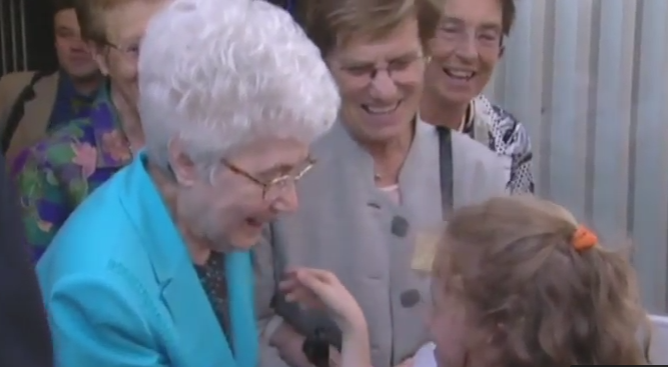
Feb 12, 2017 | Non categorizzato
 …Today the bond of a stable marriage appears almost to be in contradiction to personal freedom. Rather than stressing “relational” values, emphasis is placed on conflicts and differences. On a political level, institutions and governments draft these “matters of fact” into laws that are contrary to the overall wellbeing of the person. As a result, divorce, abortion, euthanasia and biogenetic experiments enter into people’s consciousness as things that are possible and therefore legitimate. The decline in the birth rate, living together before marriage and sexual anarchy become normal and even fashionable. How many separated and frustrated couples are there? How many children deprived of one or the other parent? How many children with addiction problems? How many people are caught up in the spiral of delinquency and prostitution? How many spouses and children are traumatized by wars? How many elderly people are abandoned? How many babies die of hunger every day? …We could create a graphic representation of the contemporary family by way of an image: a wounded and desolate mother who clutches the sufferings of humanity to her breast while crying out “Why?” to the heavens. …Yet, if we believe that behind the events of our lives, there is God with his love. If we are strengthened by this faith and recognize, in our own or others big and small daily sufferings, a shadow of the pain suffered by the crucified and forsaken Christ and our sharing in the suffering that redeemed the world, we can find meaning in the most absurd situations and put them in perspective. In the face of whatever suffering may come our way, big or small, and in the face of contradictions and problems that have no solutions, let’s try to enter within ourselves and look head on at the absurdity, injustice, innocent suffering, humiliation, alienation or desperation before us. It is there that we will recognize one of the many countenances of the “Man of Sorrows.” It is our meeting with him, the “divine person” who became an individual without relationships. He is the God of contemporary humanity, who transforms nothingness into being, suffering into love. Our “yes” to him and our readiness to love him and welcome him into our lives will enable us to go beyond our individualistic attitudes and turn us into new men and women who can heal and give new life in the most desperate situations through love. …These are not dreams. They are the everyday experiences of many families who, helped by the forsakenness of the God-Man, have transformed their tide of pain into new life. Sometimes, indeed often – the divisions are resolved and families reunited. At times, they are not: externally the situations may stay as they were, but the pain is illuminated, the anguish eased and the fracture overcome. At times, the physical or spiritual suffering lingers on but it acquires meaning when we unite our “passion” to the passion of Christ who continues to redeem and save the family and all of humanity. The burden becomes lighter. Therefore, the family can attempt to reacquire its original beauty according to its creator’s design by drawing from the source of love that Christ brought on earth. I believe that from that wellspring married couples and families can quench their thirst for authenticity, for continuous and limitless communion, and for values that are transcendent, lasting and always new. God himself can be present in their homes and share his life with them. Jesus said, “Where two or three are gathered in my name (= in my love), I am there among them” (Mt18:20). Families are being offered an incredible opportunity: to be the setting for God’s presence”. (Taken from Chiara Lubich’s talk “The family is the future” given in Lucerne, Switzerland on 16th May 1999). See the video
…Today the bond of a stable marriage appears almost to be in contradiction to personal freedom. Rather than stressing “relational” values, emphasis is placed on conflicts and differences. On a political level, institutions and governments draft these “matters of fact” into laws that are contrary to the overall wellbeing of the person. As a result, divorce, abortion, euthanasia and biogenetic experiments enter into people’s consciousness as things that are possible and therefore legitimate. The decline in the birth rate, living together before marriage and sexual anarchy become normal and even fashionable. How many separated and frustrated couples are there? How many children deprived of one or the other parent? How many children with addiction problems? How many people are caught up in the spiral of delinquency and prostitution? How many spouses and children are traumatized by wars? How many elderly people are abandoned? How many babies die of hunger every day? …We could create a graphic representation of the contemporary family by way of an image: a wounded and desolate mother who clutches the sufferings of humanity to her breast while crying out “Why?” to the heavens. …Yet, if we believe that behind the events of our lives, there is God with his love. If we are strengthened by this faith and recognize, in our own or others big and small daily sufferings, a shadow of the pain suffered by the crucified and forsaken Christ and our sharing in the suffering that redeemed the world, we can find meaning in the most absurd situations and put them in perspective. In the face of whatever suffering may come our way, big or small, and in the face of contradictions and problems that have no solutions, let’s try to enter within ourselves and look head on at the absurdity, injustice, innocent suffering, humiliation, alienation or desperation before us. It is there that we will recognize one of the many countenances of the “Man of Sorrows.” It is our meeting with him, the “divine person” who became an individual without relationships. He is the God of contemporary humanity, who transforms nothingness into being, suffering into love. Our “yes” to him and our readiness to love him and welcome him into our lives will enable us to go beyond our individualistic attitudes and turn us into new men and women who can heal and give new life in the most desperate situations through love. …These are not dreams. They are the everyday experiences of many families who, helped by the forsakenness of the God-Man, have transformed their tide of pain into new life. Sometimes, indeed often – the divisions are resolved and families reunited. At times, they are not: externally the situations may stay as they were, but the pain is illuminated, the anguish eased and the fracture overcome. At times, the physical or spiritual suffering lingers on but it acquires meaning when we unite our “passion” to the passion of Christ who continues to redeem and save the family and all of humanity. The burden becomes lighter. Therefore, the family can attempt to reacquire its original beauty according to its creator’s design by drawing from the source of love that Christ brought on earth. I believe that from that wellspring married couples and families can quench their thirst for authenticity, for continuous and limitless communion, and for values that are transcendent, lasting and always new. God himself can be present in their homes and share his life with them. Jesus said, “Where two or three are gathered in my name (= in my love), I am there among them” (Mt18:20). Families are being offered an incredible opportunity: to be the setting for God’s presence”. (Taken from Chiara Lubich’s talk “The family is the future” given in Lucerne, Switzerland on 16th May 1999). See the video

Feb 11, 2017 | Non categorizzato
 “I was born at a thousand metres in a small village of the Piedmont Prealps.” This is how Aldo Baima always began his story, grateful to the land that saw his birth and life in the company of his parents on the high mountain pastures where he grew. After elementary school, the teacher managed to convince his parents to allow Aldo to continue his studies, first in a college, and then as a commuter travelling on wagons meant for livestock. It was wartime. A priest invited him to attend a Youth Catholic Action Group: “Ten years of discoveries and apostolic endeavours,” Aldo would recall, which he threw himself into with great passion. He would return to his home pastures for the summer. A tourist who saw him holding a book on theology asked him if he intended to join the seminary. “No, not for anything!” answered Aldo. And when the girl replied: “Wouldn’t you rather be reading a love story?” Aldo declared: “But this is a very beautiful love story!” When he finished the Teaching Institute he began to work as a teacher. He enrolled at the University of Turin where he studied Pedagogy and Philosophy. He met an old friend from school there, who spoke to him about a unique experience begun in Trent by some girls who “are putting the Gospel in practice.” The conversation with his friend thickened, touching on deep questions, to the point that Aldo decided to base his own life on the practice of the Gospel. He was especially struck by one sentence that he had read and meditated on many times before, but now seemed to come alive: “Insofar as you did it to one of the least of these brothers of mine, you did it to me” (Mt 25:40). With decision he began to help the needy, discovering a brother in every poor person he met, and trying to involve his friends at the parish. In the summer of 1952 he spent a week at the focolare in Trent. Then he went to the mountains of Tondadico where the Mariapolis was taking place. “There, I had the intuition,” he confided, “that only by belonging to that family would that light and that life that I couldn’t do without really be mine.” He left his fiance and entered the focolare.
“I was born at a thousand metres in a small village of the Piedmont Prealps.” This is how Aldo Baima always began his story, grateful to the land that saw his birth and life in the company of his parents on the high mountain pastures where he grew. After elementary school, the teacher managed to convince his parents to allow Aldo to continue his studies, first in a college, and then as a commuter travelling on wagons meant for livestock. It was wartime. A priest invited him to attend a Youth Catholic Action Group: “Ten years of discoveries and apostolic endeavours,” Aldo would recall, which he threw himself into with great passion. He would return to his home pastures for the summer. A tourist who saw him holding a book on theology asked him if he intended to join the seminary. “No, not for anything!” answered Aldo. And when the girl replied: “Wouldn’t you rather be reading a love story?” Aldo declared: “But this is a very beautiful love story!” When he finished the Teaching Institute he began to work as a teacher. He enrolled at the University of Turin where he studied Pedagogy and Philosophy. He met an old friend from school there, who spoke to him about a unique experience begun in Trent by some girls who “are putting the Gospel in practice.” The conversation with his friend thickened, touching on deep questions, to the point that Aldo decided to base his own life on the practice of the Gospel. He was especially struck by one sentence that he had read and meditated on many times before, but now seemed to come alive: “Insofar as you did it to one of the least of these brothers of mine, you did it to me” (Mt 25:40). With decision he began to help the needy, discovering a brother in every poor person he met, and trying to involve his friends at the parish. In the summer of 1952 he spent a week at the focolare in Trent. Then he went to the mountains of Tondadico where the Mariapolis was taking place. “There, I had the intuition,” he confided, “that only by belonging to that family would that light and that life that I couldn’t do without really be mine.” He left his fiance and entered the focolare.  Years of generous giving followed: in Turin, Sassari, Rome, and from 1961 France. Because of his spiritual and moral integrity, young and old found in Aldo a trusted guide for their journey to God. In the face of difficult problems, his attitude was always one of deep listening. His limpid nature and openness to French culture won over many hearts and established relationships of true friendship. In 1975 he was ordained to the priesthood. In 1984 he was at the headquarters of the Movement to assist in the formation of the focolarini. Following that, he stayed in Istanbul before being transferred to the permanent Mariapolis in Montet, Switzerland. From 2001 he was once again at the Movement’s headquarters, at the service of focolarini around the world. This is where he his health began to be progressively more fragile which, in his own words: “the Father wants to finally place me in the conditions to enter into the mystery of the Abandonment and of the Resurrection that follows.” In 2005 he writes: “My certainty has been reborn that this year dedicated to Jesus Forsaken can also be the moment for me to respond to this new call. Time of salvation that comes from Him, time of grace that draws into his wound, to make us live in the bosom of the Father.” It was a grace that accompanied him through his years of nearly total immobility, in which he identified with Jesus Forsaken whom he had chosen in his youth. He died peacefully on January 12, 2017 at the age of ninety.
Years of generous giving followed: in Turin, Sassari, Rome, and from 1961 France. Because of his spiritual and moral integrity, young and old found in Aldo a trusted guide for their journey to God. In the face of difficult problems, his attitude was always one of deep listening. His limpid nature and openness to French culture won over many hearts and established relationships of true friendship. In 1975 he was ordained to the priesthood. In 1984 he was at the headquarters of the Movement to assist in the formation of the focolarini. Following that, he stayed in Istanbul before being transferred to the permanent Mariapolis in Montet, Switzerland. From 2001 he was once again at the Movement’s headquarters, at the service of focolarini around the world. This is where he his health began to be progressively more fragile which, in his own words: “the Father wants to finally place me in the conditions to enter into the mystery of the Abandonment and of the Resurrection that follows.” In 2005 he writes: “My certainty has been reborn that this year dedicated to Jesus Forsaken can also be the moment for me to respond to this new call. Time of salvation that comes from Him, time of grace that draws into his wound, to make us live in the bosom of the Father.” It was a grace that accompanied him through his years of nearly total immobility, in which he identified with Jesus Forsaken whom he had chosen in his youth. He died peacefully on January 12, 2017 at the age of ninety.
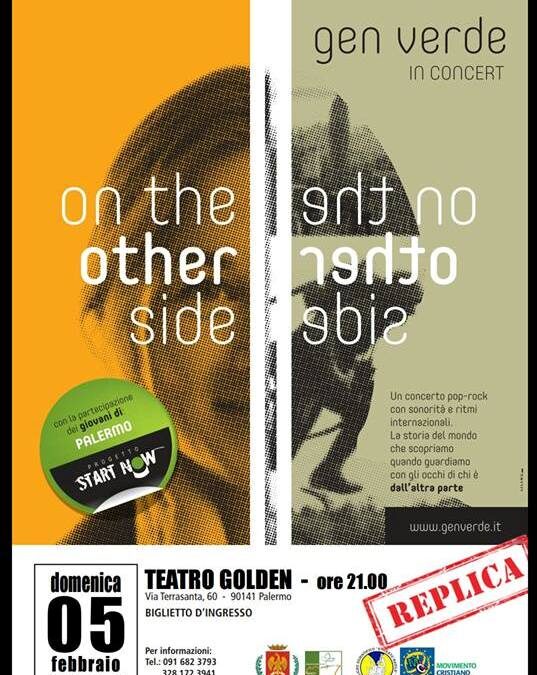
Feb 10, 2017 | Non categorizzato
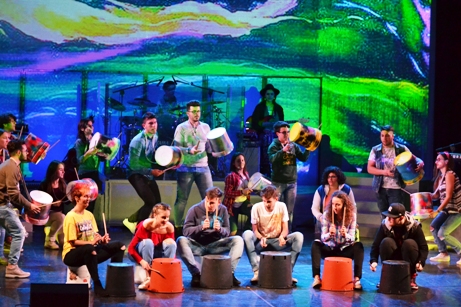 “Fulfilling, happiness, courage, family, unique experience, listening, diversity…” These were some of the keywords left behind in their comments by the teenagers from Liceo Basile school. They were also the main actors in three shows and workshops that kept them involved from January 31st – February 5th in Palermo, Italy. “Now, it’s as if I’ve become one of them, someone with a great ideal, believing that love really can overcome everything and that our hearts don’t have borders,” Irene writes. Ernesto Basile Scientific High School is considered an institutional outpost in Brancaccio, which is the quarter where Father Pino Puglisi had worked. He was murdered by the mafia in 1993 and is now a Blessed. There are social problems in the region and the problem of education is always an open question: the school drop-out rates are far from the national average. For this reason the many projects that are carried out by the school often represent the only way out. They focus on cultivating an awareness in the younger generations that they belong to a community. They also intend to give witness to a better lifestyle that goes against the norm, and to provide the opportunity to reflect on personal choices that can lead in a wrong direction.
“Fulfilling, happiness, courage, family, unique experience, listening, diversity…” These were some of the keywords left behind in their comments by the teenagers from Liceo Basile school. They were also the main actors in three shows and workshops that kept them involved from January 31st – February 5th in Palermo, Italy. “Now, it’s as if I’ve become one of them, someone with a great ideal, believing that love really can overcome everything and that our hearts don’t have borders,” Irene writes. Ernesto Basile Scientific High School is considered an institutional outpost in Brancaccio, which is the quarter where Father Pino Puglisi had worked. He was murdered by the mafia in 1993 and is now a Blessed. There are social problems in the region and the problem of education is always an open question: the school drop-out rates are far from the national average. For this reason the many projects that are carried out by the school often represent the only way out. They focus on cultivating an awareness in the younger generations that they belong to a community. They also intend to give witness to a better lifestyle that goes against the norm, and to provide the opportunity to reflect on personal choices that can lead in a wrong direction. 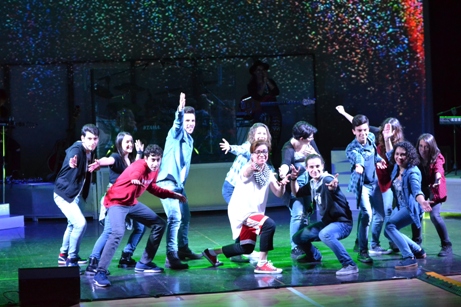 The almost accidental encounter with Gen Verde last May ignited a desire in the young people to make the Start Now project happen in their own school, just as it had in several European and Asian cities. “Tons of enthusiasm” for this event. The workshops that involved hundreds of young people were places to experience their own creativity and discover their own talents. They did side by side with the band members as actors, sharing in the different artistic experiences with mutual listening and respect. PalaOreto, February 3. The young people stepped on stage with Gen Verde in front of a crowd of thousands of teenagers from the schools in the neighborhood. It happened again on the following Sunday at the Golden Theatre.
The almost accidental encounter with Gen Verde last May ignited a desire in the young people to make the Start Now project happen in their own school, just as it had in several European and Asian cities. “Tons of enthusiasm” for this event. The workshops that involved hundreds of young people were places to experience their own creativity and discover their own talents. They did side by side with the band members as actors, sharing in the different artistic experiences with mutual listening and respect. PalaOreto, February 3. The young people stepped on stage with Gen Verde in front of a crowd of thousands of teenagers from the schools in the neighborhood. It happened again on the following Sunday at the Golden Theatre. 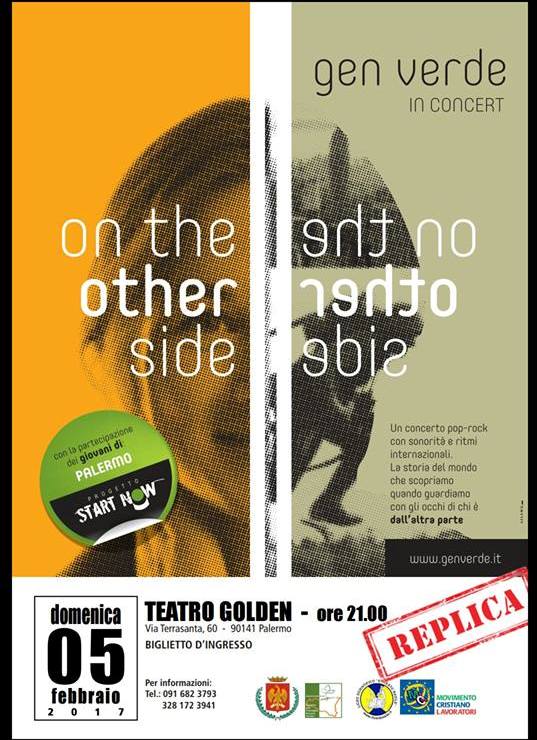 Excited but secure in their performance, they gave the best of themselves in the choreographies, songs, dances and theatre in a way that drew in the audience. Above all, they lived an experience that was unique unto itself, an experience that doesn’t conceive of “walls” and that lifted up the differences and diversity, showing how marginalization can be overcome. “The day after had a sense of nostalgia, but now it was different: It had the sense of a challenge! Good Start to all off us, small warriors on the outskirts!” wrote a teacher on her Facebook page, who helped promote the event. That’s the dream of those who interact with these young people every day, standing against marginalization and uneasiness with creativity and positive stimulation, helping others to not remain closed in their own everyday environments, promoting an inclusive environment at school that embraces all the sides of a person.
Excited but secure in their performance, they gave the best of themselves in the choreographies, songs, dances and theatre in a way that drew in the audience. Above all, they lived an experience that was unique unto itself, an experience that doesn’t conceive of “walls” and that lifted up the differences and diversity, showing how marginalization can be overcome. “The day after had a sense of nostalgia, but now it was different: It had the sense of a challenge! Good Start to all off us, small warriors on the outskirts!” wrote a teacher on her Facebook page, who helped promote the event. That’s the dream of those who interact with these young people every day, standing against marginalization and uneasiness with creativity and positive stimulation, helping others to not remain closed in their own everyday environments, promoting an inclusive environment at school that embraces all the sides of a person.

Feb 7, 2017 | Non categorizzato
 Head of the Class Ever since I heard such new things about God-Love I can’t be disturbing at school, doodling at my desk. The teacher even noticed the change in me and appointed me head of the class. Now it’s difficult for me to point out my classmates bad conduct, because I try to see Jesus in them and feel bad when they are punished. One day, since I didn’t, another student went to report three of us. To avoid their punishment, I convinced the teacher to let them clean the classroom, and after class I went to help them. Since then, little by little, the atmosphere in class is beginning to improve. (Victoria – Uganda) Fundraising When I learned that the father of a large poor family needed emergency surgery and didn’t have the money for the operation, some friends and I began a fundraiser with our colleagues at work. When we had the money, I accompanied the father to hospital and paid for the medical treatment. The operation went well. I don’t know who was happier, the family or us! I think that small gestures such as these also help contribute to peace. ( N. Y.- Jordan) In the airport At the baggage control there was a passenger in front of me who was quite upset because he had to leave behind a jar of jam. “Well, at least don’t throw it out, because it’s special!” When I got through baggage control that same person told me that the jam had been made by his mother for her grandchildren. “All her love is in those bottles,” he added. After a silent pause: “Why does the world have to be goverened by fear? Yes, I understand, with all that’s going on . . . but even the social infrastructure itself instills fear and mistrust. Where has the beauty gone in life?” I didn’t have answers, only the same questions. Meanwhile, a little girl was smiling as she passed in front of us in a wheelchair. We looked at her and that happy little face completely silenced us. All you need is a smile and even an aiport gets lit up. (C. M. – Austria) Praying together I was in the oncology department for examinations and treatment. It was an opportunity to love others with small concrete gestures and sharing in their suffering. That day my roomate – a stocky farmer of rude appearance – was about to undergo chemo. Just then he received news from the doctor and nurse that his son had died and the man’s therapy was postponed so that he could return home. I watched as his body bent beneath the tremendous shock. When we were alone and he was preparing his bag and weeping, I gathered my courage and with gentleness and respect asked him if he ever prayed. When he said yes, I invited him to pray the Our Father together for his son. It struck me as I watched that 73 year-old man join his hands and pray. And I thanked God that I dared to ask him to pray together. (Pablo – Philippines)
Head of the Class Ever since I heard such new things about God-Love I can’t be disturbing at school, doodling at my desk. The teacher even noticed the change in me and appointed me head of the class. Now it’s difficult for me to point out my classmates bad conduct, because I try to see Jesus in them and feel bad when they are punished. One day, since I didn’t, another student went to report three of us. To avoid their punishment, I convinced the teacher to let them clean the classroom, and after class I went to help them. Since then, little by little, the atmosphere in class is beginning to improve. (Victoria – Uganda) Fundraising When I learned that the father of a large poor family needed emergency surgery and didn’t have the money for the operation, some friends and I began a fundraiser with our colleagues at work. When we had the money, I accompanied the father to hospital and paid for the medical treatment. The operation went well. I don’t know who was happier, the family or us! I think that small gestures such as these also help contribute to peace. ( N. Y.- Jordan) In the airport At the baggage control there was a passenger in front of me who was quite upset because he had to leave behind a jar of jam. “Well, at least don’t throw it out, because it’s special!” When I got through baggage control that same person told me that the jam had been made by his mother for her grandchildren. “All her love is in those bottles,” he added. After a silent pause: “Why does the world have to be goverened by fear? Yes, I understand, with all that’s going on . . . but even the social infrastructure itself instills fear and mistrust. Where has the beauty gone in life?” I didn’t have answers, only the same questions. Meanwhile, a little girl was smiling as she passed in front of us in a wheelchair. We looked at her and that happy little face completely silenced us. All you need is a smile and even an aiport gets lit up. (C. M. – Austria) Praying together I was in the oncology department for examinations and treatment. It was an opportunity to love others with small concrete gestures and sharing in their suffering. That day my roomate – a stocky farmer of rude appearance – was about to undergo chemo. Just then he received news from the doctor and nurse that his son had died and the man’s therapy was postponed so that he could return home. I watched as his body bent beneath the tremendous shock. When we were alone and he was preparing his bag and weeping, I gathered my courage and with gentleness and respect asked him if he ever prayed. When he said yes, I invited him to pray the Our Father together for his son. It struck me as I watched that 73 year-old man join his hands and pray. And I thanked God that I dared to ask him to pray together. (Pablo – Philippines)
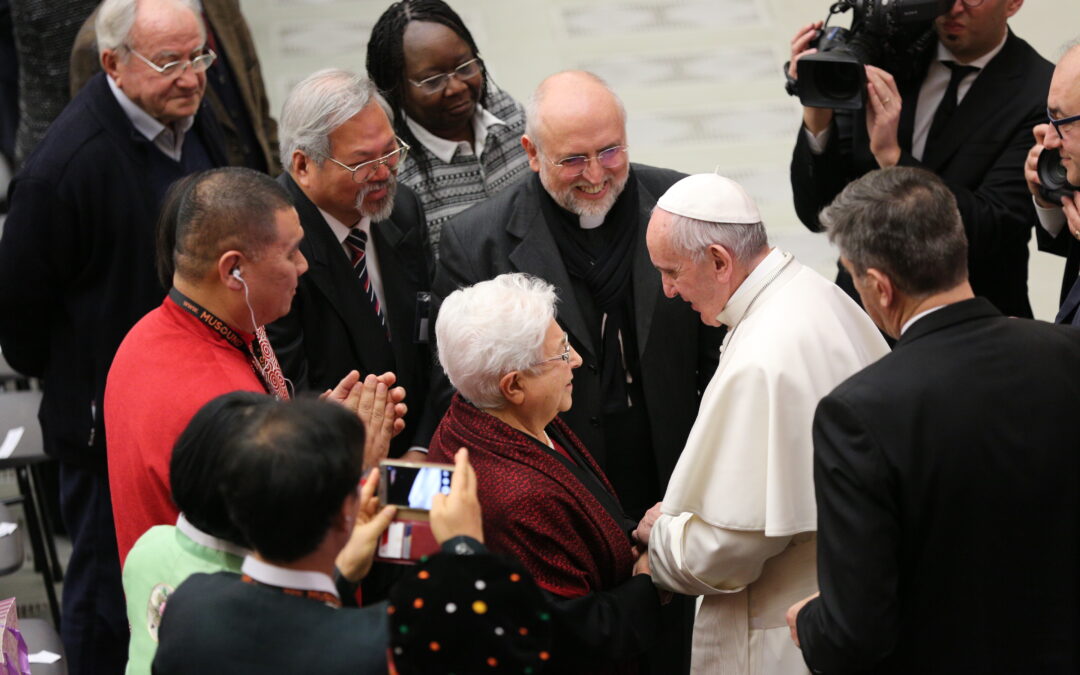
Feb 4, 2017 | Non categorizzato
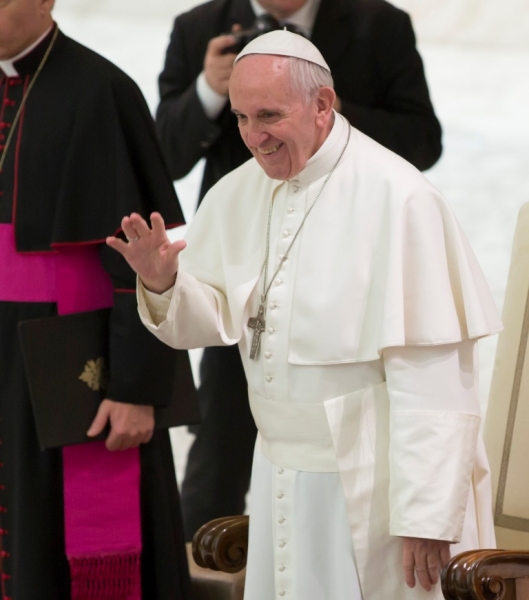 “Economy and communion. These are two words that contemporary culture keeps separate and often considers opposites. Two words that you have instead joined, accepting the invitation that Chiara Lubich offered you 25 years ago in Brazil, when, in the face of the scandal of inequality in the city of Sao Paulo, she asked entrepreneurs to become agents of communion”. Pope Francis said these words in his welcoming speech to 1200 entrepreneurs, young people and scholars who came together to celebrate the 25 years of life of the Economy of Communion. In the opening sentence of his address he said that he was pleased to welcome representatives of a project “in which I have been genuinely interested for some time”. “With your life you demonstrate that economy and communion become more beautiful when they are beside each other. Certainly the economy becomes more beautiful, but communion is also more beautiful, because the spiritual commnuion of hearts is even fuller when it becomes communion of goods, of talents, of profits”.
“Economy and communion. These are two words that contemporary culture keeps separate and often considers opposites. Two words that you have instead joined, accepting the invitation that Chiara Lubich offered you 25 years ago in Brazil, when, in the face of the scandal of inequality in the city of Sao Paulo, she asked entrepreneurs to become agents of communion”. Pope Francis said these words in his welcoming speech to 1200 entrepreneurs, young people and scholars who came together to celebrate the 25 years of life of the Economy of Communion. In the opening sentence of his address he said that he was pleased to welcome representatives of a project “in which I have been genuinely interested for some time”. “With your life you demonstrate that economy and communion become more beautiful when they are beside each other. Certainly the economy becomes more beautiful, but communion is also more beautiful, because the spiritual commnuion of hearts is even fuller when it becomes communion of goods, of talents, of profits”. 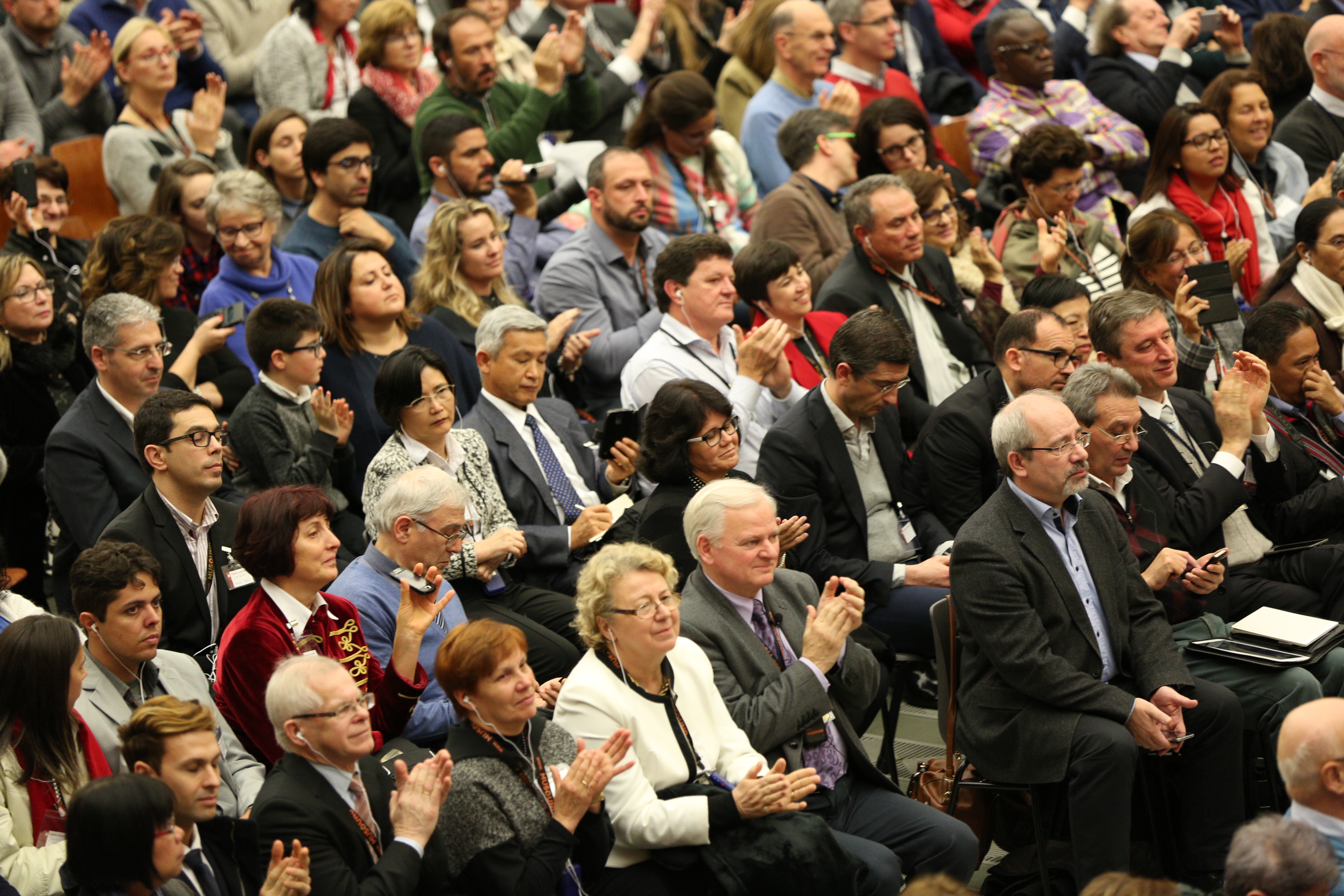 In his message to the extremely attentive gathering, Pope Francis expressed hope and recommendations on three main points. The first concerns money. “It is very important that at the centre of the economy of communion there be the communion of your profits. The Economy of Communion is also the communion of profits, an expression of the communion of life”. “Money”, he said “becomes an idol when it becomes the aim (…). It was Jesus who defined money as a ‘master’: ‘No man can serve two masters”. And he continued: “Thus, one understands the ethical and spiritual value of your choice to pool profits. The best and most practical way to avoid making an idol of money is to share it with others, above all with the poor (…). When you share and donate your profits, you are performing an act of lofty spirituality, saying to money through your deeds: you are not God, you are not lord, you are not master!” The second concerns poverty. “The principal ethical dilemma of this capitalism is the creation of discarded people, then trying to hide them or make sure they are no longer seen (…). Aircraft pollute the atmosphere, but, with a small part of the cost of the ticket, they will plant trees to compensate for the damage created. Gambling companies finance campaigns to care for the pathological gamblers that they create. And the day that the weapons industry finances hospitals to care for the children mutilated by their bombs, the system will have reached its pinnacle. This is hypocrisy!”. Faced with this abominable situation “the Economy of Communion, if it wants to be faithful to its charism, must not only care for victims, but build a system where there are ever fewer victims, where, possibly, there may no longer be any. As long as the economy still produces one victim and there is still a single discarded person, communion has not yet been realized; the celebration of universal fraternity is not full”.
In his message to the extremely attentive gathering, Pope Francis expressed hope and recommendations on three main points. The first concerns money. “It is very important that at the centre of the economy of communion there be the communion of your profits. The Economy of Communion is also the communion of profits, an expression of the communion of life”. “Money”, he said “becomes an idol when it becomes the aim (…). It was Jesus who defined money as a ‘master’: ‘No man can serve two masters”. And he continued: “Thus, one understands the ethical and spiritual value of your choice to pool profits. The best and most practical way to avoid making an idol of money is to share it with others, above all with the poor (…). When you share and donate your profits, you are performing an act of lofty spirituality, saying to money through your deeds: you are not God, you are not lord, you are not master!” The second concerns poverty. “The principal ethical dilemma of this capitalism is the creation of discarded people, then trying to hide them or make sure they are no longer seen (…). Aircraft pollute the atmosphere, but, with a small part of the cost of the ticket, they will plant trees to compensate for the damage created. Gambling companies finance campaigns to care for the pathological gamblers that they create. And the day that the weapons industry finances hospitals to care for the children mutilated by their bombs, the system will have reached its pinnacle. This is hypocrisy!”. Faced with this abominable situation “the Economy of Communion, if it wants to be faithful to its charism, must not only care for victims, but build a system where there are ever fewer victims, where, possibly, there may no longer be any. As long as the economy still produces one victim and there is still a single discarded person, communion has not yet been realized; the celebration of universal fraternity is not full”. 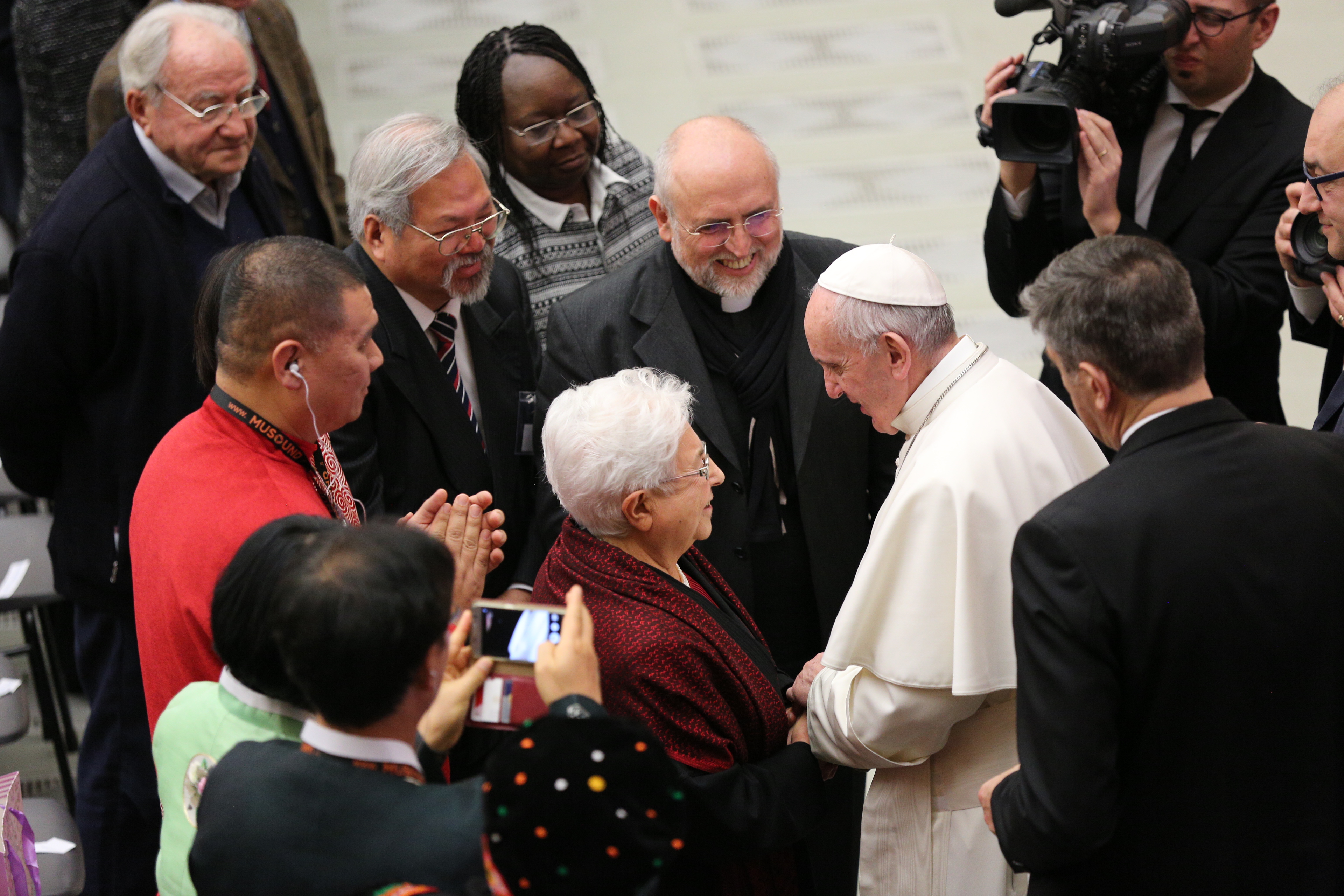 The third point concerns the future. «These 25 years of your history say that communion and business can exist and grow together” , an experience limited to a small number of businesses when compared to the world’s great capital, “but the changes in the order of the spirit and therefore of life are not linked to big numbers. The small flock, the lamp, a coin, a lamb, a pearl, salt, leaven: these are the images of the Kingdom we encounter in the Gospels (…). It is not necessary to be in a large group to change our life: suffice it that the sale and the leaven do not deteriorate (…). Salt does not do its job by increasing in quantity – instead too much salt makes the meal salty – but by saving its ‘spirit’, its quality”. While recalling the time when there were no refrigerators and the mother dough was shared to make bread, the Pope encouraged the Economy of Communion entrepreneurs “not to lose the active ingredient, the ‘enzyme’ of communion”, by living “reciprocity”. “Communion is not only the sharing but also the multiplying goods, the creation of new bread, of new goods, of new Good with a capital ‘G’”. He invited those present to: “Give it to everyone, firstly to the poor and the young (…). Capitalism knows philanthropy, not communion”. At the end of his speech Pope Francis said: “You already do these things. But you can share more profits in order to combat idolatry, change structures in order to prevent the creation of victims ‘ and discarded people; give more of your leaven so as to leaven the bread of many. May the ‘no’ to an economy that kills, become a ‘yes’ to an economy that lets live, because it shares, includes the poor, uses profits to create communion». «I hope you continue on your path, with courage, humilty, and joy…, continue to be the seed, salt and leaven of another economy: the economy of the Kingdom, where the rich know how to share their wealth, and the poor are called “blessed”. This new awareness makes one look ahead with joy and a renewed commitment. Press Releases
The third point concerns the future. «These 25 years of your history say that communion and business can exist and grow together” , an experience limited to a small number of businesses when compared to the world’s great capital, “but the changes in the order of the spirit and therefore of life are not linked to big numbers. The small flock, the lamp, a coin, a lamb, a pearl, salt, leaven: these are the images of the Kingdom we encounter in the Gospels (…). It is not necessary to be in a large group to change our life: suffice it that the sale and the leaven do not deteriorate (…). Salt does not do its job by increasing in quantity – instead too much salt makes the meal salty – but by saving its ‘spirit’, its quality”. While recalling the time when there were no refrigerators and the mother dough was shared to make bread, the Pope encouraged the Economy of Communion entrepreneurs “not to lose the active ingredient, the ‘enzyme’ of communion”, by living “reciprocity”. “Communion is not only the sharing but also the multiplying goods, the creation of new bread, of new goods, of new Good with a capital ‘G’”. He invited those present to: “Give it to everyone, firstly to the poor and the young (…). Capitalism knows philanthropy, not communion”. At the end of his speech Pope Francis said: “You already do these things. But you can share more profits in order to combat idolatry, change structures in order to prevent the creation of victims ‘ and discarded people; give more of your leaven so as to leaven the bread of many. May the ‘no’ to an economy that kills, become a ‘yes’ to an economy that lets live, because it shares, includes the poor, uses profits to create communion». «I hope you continue on your path, with courage, humilty, and joy…, continue to be the seed, salt and leaven of another economy: the economy of the Kingdom, where the rich know how to share their wealth, and the poor are called “blessed”. This new awareness makes one look ahead with joy and a renewed commitment. Press Releases
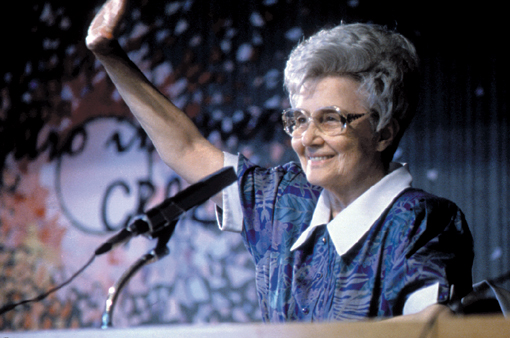
Feb 4, 2017 | Non categorizzato
 “You know that the idea of the Economy of Communion has awakened latent energies in many of us (from the youngest to the oldest). It has prompted important and demanding decisions and shown ways of making what seemed unbelievable dreams come true. You also know it has triggered the mechanism of “giving” so that almost everyone, we can say, is committed in offering services, prayers, energy and money; in offering to move, to give land, homes and jewellery. You know too that seeds of promising business enterprises, aimed at sharing part of their profits with those in need, are already blossoming like a new springtime everywhere. You know that places in which “new people” will be trained are rising up as if by magic and that the little towns are multiplying. Now, in order for everything to grow and mature, we must strengthen this virtue of “giving”, so that it becomes a habit for us. The enthusiasm with which the Economy of Communion began has to remain alive within us and grow. We must not disappoint the great hopes and expectations of the needy, as well as the explicit and often enlightened words of encouragement from religious leaders, economists, business people and other experts. We must keep the Economy of Communion alive in all its aspects, until there is no longer anyone in need among us. Then, there will be a surprising reality that is both human and divine: a whole “body of people” will proclaim God to the world and reveal his presence in history to many, as someone said referring to our project. … So “giving”. … Let’s give always, giving a smile, understanding, forgiveness or a listening ear; let’s give our intelligence, our will and availability; let’s give our time, talents and ideas (every idea is a responsibility); let’s give our actions, experiences and skills; let’s give our goods which we review periodically so that nothing accumulates and everything circulates. Giving: let this be the Word that allows us no respite. We want to live it for the glory of God and to bring back the spirit and practice of the early Christians, who “were of one heart and soul … there was not a needy person among them”. (Acts 4:32-34)” Chiara Lubich (Taken from a telephone conference call with the focolare communities in different parts of the world, 23rd April 1992).
“You know that the idea of the Economy of Communion has awakened latent energies in many of us (from the youngest to the oldest). It has prompted important and demanding decisions and shown ways of making what seemed unbelievable dreams come true. You also know it has triggered the mechanism of “giving” so that almost everyone, we can say, is committed in offering services, prayers, energy and money; in offering to move, to give land, homes and jewellery. You know too that seeds of promising business enterprises, aimed at sharing part of their profits with those in need, are already blossoming like a new springtime everywhere. You know that places in which “new people” will be trained are rising up as if by magic and that the little towns are multiplying. Now, in order for everything to grow and mature, we must strengthen this virtue of “giving”, so that it becomes a habit for us. The enthusiasm with which the Economy of Communion began has to remain alive within us and grow. We must not disappoint the great hopes and expectations of the needy, as well as the explicit and often enlightened words of encouragement from religious leaders, economists, business people and other experts. We must keep the Economy of Communion alive in all its aspects, until there is no longer anyone in need among us. Then, there will be a surprising reality that is both human and divine: a whole “body of people” will proclaim God to the world and reveal his presence in history to many, as someone said referring to our project. … So “giving”. … Let’s give always, giving a smile, understanding, forgiveness or a listening ear; let’s give our intelligence, our will and availability; let’s give our time, talents and ideas (every idea is a responsibility); let’s give our actions, experiences and skills; let’s give our goods which we review periodically so that nothing accumulates and everything circulates. Giving: let this be the Word that allows us no respite. We want to live it for the glory of God and to bring back the spirit and practice of the early Christians, who “were of one heart and soul … there was not a needy person among them”. (Acts 4:32-34)” Chiara Lubich (Taken from a telephone conference call with the focolare communities in different parts of the world, 23rd April 1992).

 …Today the bond of a stable marriage appears almost to be in contradiction to personal freedom. Rather than stressing “relational” values, emphasis is placed on conflicts and differences. On a political level, institutions and governments draft these “matters of fact” into laws that are contrary to the overall wellbeing of the person. As a result, divorce, abortion, euthanasia and biogenetic experiments enter into people’s consciousness as things that are possible and therefore legitimate. The decline in the birth rate, living together before marriage and sexual anarchy become normal and even fashionable. How many separated and frustrated couples are there? How many children deprived of one or the other parent? How many children with addiction problems? How many people are caught up in the spiral of delinquency and prostitution? How many spouses and children are traumatized by wars? How many elderly people are abandoned? How many babies die of hunger every day? …We could create a graphic representation of the contemporary family by way of an image: a wounded and desolate mother who clutches the sufferings of humanity to her breast while crying out “Why?” to the heavens. …Yet, if we believe that behind the events of our lives, there is God with his love. If we are strengthened by this faith and recognize, in our own or others big and small daily sufferings, a shadow of the pain suffered by the crucified and forsaken Christ and our sharing in the suffering that redeemed the world, we can find meaning in the most absurd situations and put them in perspective. In the face of whatever suffering may come our way, big or small, and in the face of contradictions and problems that have no solutions, let’s try to enter within ourselves and look head on at the absurdity, injustice, innocent suffering, humiliation, alienation or desperation before us. It is there that we will recognize one of the many countenances of the “Man of Sorrows.” It is our meeting with him, the “divine person” who became an individual without relationships. He is the God of contemporary humanity, who transforms nothingness into being, suffering into love. Our “yes” to him and our readiness to love him and welcome him into our lives will enable us to go beyond our individualistic attitudes and turn us into new men and women who can heal and give new life in the most desperate situations through love. …These are not dreams. They are the everyday experiences of many families who, helped by the forsakenness of the God-Man, have transformed their tide of pain into new life. Sometimes, indeed often – the divisions are resolved and families reunited. At times, they are not: externally the situations may stay as they were, but the pain is illuminated, the anguish eased and the fracture overcome. At times, the physical or spiritual suffering lingers on but it acquires meaning when we unite our “passion” to the passion of Christ who continues to redeem and save the family and all of humanity. The burden becomes lighter. Therefore, the family can attempt to reacquire its original beauty according to its creator’s design by drawing from the source of love that Christ brought on earth. I believe that from that wellspring married couples and families can quench their thirst for authenticity, for continuous and limitless communion, and for values that are transcendent, lasting and always new. God himself can be present in their homes and share his life with them. Jesus said, “Where two or three are gathered in my name (= in my love), I am there among them” (Mt18:20). Families are being offered an incredible opportunity: to be the setting for God’s presence”. (Taken from Chiara Lubich’s talk “The family is the future” given in Lucerne, Switzerland on 16th May 1999). See the video
…Today the bond of a stable marriage appears almost to be in contradiction to personal freedom. Rather than stressing “relational” values, emphasis is placed on conflicts and differences. On a political level, institutions and governments draft these “matters of fact” into laws that are contrary to the overall wellbeing of the person. As a result, divorce, abortion, euthanasia and biogenetic experiments enter into people’s consciousness as things that are possible and therefore legitimate. The decline in the birth rate, living together before marriage and sexual anarchy become normal and even fashionable. How many separated and frustrated couples are there? How many children deprived of one or the other parent? How many children with addiction problems? How many people are caught up in the spiral of delinquency and prostitution? How many spouses and children are traumatized by wars? How many elderly people are abandoned? How many babies die of hunger every day? …We could create a graphic representation of the contemporary family by way of an image: a wounded and desolate mother who clutches the sufferings of humanity to her breast while crying out “Why?” to the heavens. …Yet, if we believe that behind the events of our lives, there is God with his love. If we are strengthened by this faith and recognize, in our own or others big and small daily sufferings, a shadow of the pain suffered by the crucified and forsaken Christ and our sharing in the suffering that redeemed the world, we can find meaning in the most absurd situations and put them in perspective. In the face of whatever suffering may come our way, big or small, and in the face of contradictions and problems that have no solutions, let’s try to enter within ourselves and look head on at the absurdity, injustice, innocent suffering, humiliation, alienation or desperation before us. It is there that we will recognize one of the many countenances of the “Man of Sorrows.” It is our meeting with him, the “divine person” who became an individual without relationships. He is the God of contemporary humanity, who transforms nothingness into being, suffering into love. Our “yes” to him and our readiness to love him and welcome him into our lives will enable us to go beyond our individualistic attitudes and turn us into new men and women who can heal and give new life in the most desperate situations through love. …These are not dreams. They are the everyday experiences of many families who, helped by the forsakenness of the God-Man, have transformed their tide of pain into new life. Sometimes, indeed often – the divisions are resolved and families reunited. At times, they are not: externally the situations may stay as they were, but the pain is illuminated, the anguish eased and the fracture overcome. At times, the physical or spiritual suffering lingers on but it acquires meaning when we unite our “passion” to the passion of Christ who continues to redeem and save the family and all of humanity. The burden becomes lighter. Therefore, the family can attempt to reacquire its original beauty according to its creator’s design by drawing from the source of love that Christ brought on earth. I believe that from that wellspring married couples and families can quench their thirst for authenticity, for continuous and limitless communion, and for values that are transcendent, lasting and always new. God himself can be present in their homes and share his life with them. Jesus said, “Where two or three are gathered in my name (= in my love), I am there among them” (Mt18:20). Families are being offered an incredible opportunity: to be the setting for God’s presence”. (Taken from Chiara Lubich’s talk “The family is the future” given in Lucerne, Switzerland on 16th May 1999). See the video






 Excited but secure in their performance, they gave the best of themselves in the choreographies, songs, dances and theatre in a way that drew in the audience. Above all, they lived an experience that was unique unto itself, an experience that doesn’t conceive of “walls” and that lifted up the differences and diversity, showing how marginalization can be overcome. “The day after had a sense of nostalgia, but now it was different: It had the sense of a challenge! Good Start to all off us, small warriors on the outskirts!” wrote a teacher on her Facebook page, who helped promote the event. That’s the dream of those who interact with these young people every day, standing against marginalization and uneasiness with creativity and positive stimulation, helping others to not remain closed in their own everyday environments, promoting an inclusive environment at school that embraces all the sides of a person.
Excited but secure in their performance, they gave the best of themselves in the choreographies, songs, dances and theatre in a way that drew in the audience. Above all, they lived an experience that was unique unto itself, an experience that doesn’t conceive of “walls” and that lifted up the differences and diversity, showing how marginalization can be overcome. “The day after had a sense of nostalgia, but now it was different: It had the sense of a challenge! Good Start to all off us, small warriors on the outskirts!” wrote a teacher on her Facebook page, who helped promote the event. That’s the dream of those who interact with these young people every day, standing against marginalization and uneasiness with creativity and positive stimulation, helping others to not remain closed in their own everyday environments, promoting an inclusive environment at school that embraces all the sides of a person.

 In his message to the extremely attentive gathering, Pope Francis expressed hope and recommendations on three main points. The first concerns money. “It is very important that at the centre of the economy of communion there be the communion of your profits. The Economy of Communion is also the communion of profits, an expression of the communion of life”. “Money”, he said “becomes an idol when it becomes the aim (…). It was Jesus who defined money as a ‘master’: ‘No man can serve two masters”. And he continued: “Thus, one understands the ethical and spiritual value of your choice to pool profits. The best and most practical way to avoid making an idol of money is to share it with others, above all with the poor (…). When you share and donate your profits, you are performing an act of lofty spirituality, saying to money through your deeds: you are not God, you are not lord, you are not master!” The second concerns poverty. “The principal ethical dilemma of this capitalism is the creation of discarded people, then trying to hide them or make sure they are no longer seen (…). Aircraft pollute the atmosphere, but, with a small part of the cost of the ticket, they will plant trees to compensate for the damage created. Gambling companies finance campaigns to care for the pathological gamblers that they create. And the day that the weapons industry finances hospitals to care for the children mutilated by their bombs, the system will have reached its pinnacle. This is hypocrisy!”. Faced with this abominable situation “the Economy of Communion, if it wants to be faithful to its charism, must not only care for victims, but build a system where there are ever fewer victims, where, possibly, there may no longer be any. As long as the economy still produces one victim and there is still a single discarded person, communion has not yet been realized; the celebration of universal fraternity is not full”.
In his message to the extremely attentive gathering, Pope Francis expressed hope and recommendations on three main points. The first concerns money. “It is very important that at the centre of the economy of communion there be the communion of your profits. The Economy of Communion is also the communion of profits, an expression of the communion of life”. “Money”, he said “becomes an idol when it becomes the aim (…). It was Jesus who defined money as a ‘master’: ‘No man can serve two masters”. And he continued: “Thus, one understands the ethical and spiritual value of your choice to pool profits. The best and most practical way to avoid making an idol of money is to share it with others, above all with the poor (…). When you share and donate your profits, you are performing an act of lofty spirituality, saying to money through your deeds: you are not God, you are not lord, you are not master!” The second concerns poverty. “The principal ethical dilemma of this capitalism is the creation of discarded people, then trying to hide them or make sure they are no longer seen (…). Aircraft pollute the atmosphere, but, with a small part of the cost of the ticket, they will plant trees to compensate for the damage created. Gambling companies finance campaigns to care for the pathological gamblers that they create. And the day that the weapons industry finances hospitals to care for the children mutilated by their bombs, the system will have reached its pinnacle. This is hypocrisy!”. Faced with this abominable situation “the Economy of Communion, if it wants to be faithful to its charism, must not only care for victims, but build a system where there are ever fewer victims, where, possibly, there may no longer be any. As long as the economy still produces one victim and there is still a single discarded person, communion has not yet been realized; the celebration of universal fraternity is not full”.  The third point concerns the future. «These 25 years of your history say that communion and business can exist and grow together” , an experience limited to a small number of businesses when compared to the world’s great capital, “but the changes in the order of the spirit and therefore of life are not linked to big numbers. The small flock, the lamp, a coin, a lamb, a pearl, salt, leaven: these are the images of the Kingdom we encounter in the Gospels (…). It is not necessary to be in a large group to change our life: suffice it that the sale and the leaven do not deteriorate (…). Salt does not do its job by increasing in quantity – instead too much salt makes the meal salty – but by saving its ‘spirit’, its quality”. While recalling the time when there were no refrigerators and the mother dough was shared to make bread, the Pope encouraged the Economy of Communion entrepreneurs “not to lose the active ingredient, the ‘enzyme’ of communion”, by living “reciprocity”. “Communion is not only the sharing but also the multiplying goods, the creation of new bread, of new goods, of new Good with a capital ‘G’”. He invited those present to: “Give it to everyone, firstly to the poor and the young (…). Capitalism knows philanthropy, not communion”. At the end of his speech Pope Francis said: “You already do these things. But you can share more profits in order to combat idolatry, change structures in order to prevent the creation of victims ‘ and discarded people; give more of your leaven so as to leaven the bread of many. May the ‘no’ to an economy that kills, become a ‘yes’ to an economy that lets live, because it shares, includes the poor, uses profits to create communion». «I hope you continue on your path, with courage, humilty, and joy…, continue to be the seed, salt and leaven of another economy: the economy of the Kingdom, where the rich know how to share their wealth, and the poor are called “blessed”. This new awareness makes one look ahead with joy and a renewed commitment.
The third point concerns the future. «These 25 years of your history say that communion and business can exist and grow together” , an experience limited to a small number of businesses when compared to the world’s great capital, “but the changes in the order of the spirit and therefore of life are not linked to big numbers. The small flock, the lamp, a coin, a lamb, a pearl, salt, leaven: these are the images of the Kingdom we encounter in the Gospels (…). It is not necessary to be in a large group to change our life: suffice it that the sale and the leaven do not deteriorate (…). Salt does not do its job by increasing in quantity – instead too much salt makes the meal salty – but by saving its ‘spirit’, its quality”. While recalling the time when there were no refrigerators and the mother dough was shared to make bread, the Pope encouraged the Economy of Communion entrepreneurs “not to lose the active ingredient, the ‘enzyme’ of communion”, by living “reciprocity”. “Communion is not only the sharing but also the multiplying goods, the creation of new bread, of new goods, of new Good with a capital ‘G’”. He invited those present to: “Give it to everyone, firstly to the poor and the young (…). Capitalism knows philanthropy, not communion”. At the end of his speech Pope Francis said: “You already do these things. But you can share more profits in order to combat idolatry, change structures in order to prevent the creation of victims ‘ and discarded people; give more of your leaven so as to leaven the bread of many. May the ‘no’ to an economy that kills, become a ‘yes’ to an economy that lets live, because it shares, includes the poor, uses profits to create communion». «I hope you continue on your path, with courage, humilty, and joy…, continue to be the seed, salt and leaven of another economy: the economy of the Kingdom, where the rich know how to share their wealth, and the poor are called “blessed”. This new awareness makes one look ahead with joy and a renewed commitment. 